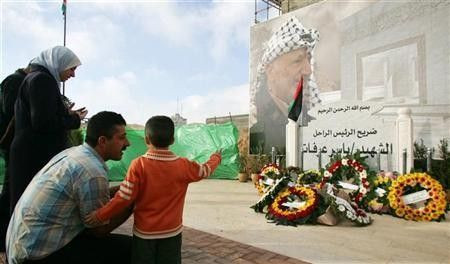Documentary looks at life of Palestinian leader Arafat

Associates of Yasser Arafat offer personal recollections in a documentary screened in Dubai this week on his search for an Israeli-Palestinian peace deal that descended into violence and failed to lead to a Palestinian state.
Figures from Arafat's circle who entered into a historic peace process with Israel in 1993, including his wife Suha, as well as Israelis such as President Shimon Peres and activist Uri Avnery who knew him well, discuss controversial moments of a career that ended with Arafat's unexplained death in 2004.
Arafat was depicted by his Israeli and U.S. detractors as an obstacle to bringing the peace talks to a resolution and who sought to take advantage of the violence of the Palestinian uprising which followed the breakdown of critical talks in 2000.
Peres sticks to that view in the The Price of Kings - Yasser Arafat, a sympathetic portrayal of Arafat by British director Richard Symons shown at the Dubai International Film Festival in which friends recall private moments.
Without him we couldn't start, with him we couldn't finish, Peres says of the Oslo peace process that created self-rule for Palestinians in territories Israel occupied in 1967. At the last moment he didn't take the tough decision.
Other confidantes of Arafat, however, question those views, describing a man who took an enormous risk with a doomed bet on a peace process led by Peres and Israeli Prime Minister Yitzhak Rabin, who was assassinated by a right-wing Israeli in 1995.
Nasser al-Kidwa, a nephew who is now Palestinian envoy to the United Nations, recounts Arafat's gloom after Rabin's death. Kidwa found a quiet, dejected figure when he visited Arafat in his office several days later.
Before leaving I said something to the effect of 'why are you so upset? Okay Rabin was an important leader, but Peres is coming and Peres has an even better position than Rabin', he remembers in one of the film's most poignant sections.
He didn't answer me, but he gave me that look that obviously meant that I didn't understand anything. And I didn't, he was right, clearly.
Shimon Peres lost the subsequent 1996 election to Likud leader Benyamin Netanyahu, signaling a shift to the right in Israeli politics and a stagnation in the peace process that has lasted to this day.
PEACE TALKS STALLED
Shunned by Washington and besieged by Israel in his Ramallah compound, Arafat died as the uprising was winding down. His widow is in tears as she recalls those final days.
Arafat's successor Mahmoud Abbas has been no more successful in moving talks forward with Netanyahu, in power once more, and Palestinians in the territories remain stateless.
Nabil Shaath, another veteran of the self-rule administrations set up through Oslo, says Arafat feared entering the final status peace talks in 2000.
He was not prepared to make the concessions Israel and the U.S. administration hoped could be secured from him quickly, Shaath says. Those talks stumbled over the status of Jerusalem and Palestinian refugees.
He was viewed by his enemies on our side as being too lenient, for giving up. Also, he created expectations that were quite opposite from the truth when it came to permanent settlement negotiations, Shaath said.
When he came to Camp David, and the permanent settlement, he was as tough as nails and Mr. (U.S. President Bill) Clinton did not expect that.
The Israeli and Palestinian acquaintances interviewed acknowledge Arafat's charisma and achievement in uniting Palestinians across political and geographical divides. But say his desire to avoid making enemies led to overlooking corruption in his administration, helping provoke the 2000 uprising.
Arafat's many bitter opponents among Palestinian and Arab politicians and intellectuals are notably absent from the documentary, which also includes some rare footage. It is the first of 12 on world leaders from Symon's Spirit Level Film.
Symons said this was due to the film's focus on those close to Arafat with personal stories and a willingness to talk. He also said the work had no agenda but that it had changed some of the views he grew up with in London's Jewish community .
I have a better understanding of the distortion and how important it is to question that from time to time, he said. He lived through the most difficult, extraordinary circumstances through 60 years.
© Copyright Thomson Reuters 2024. All rights reserved.





















